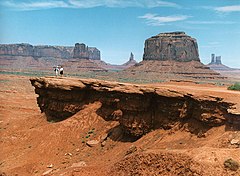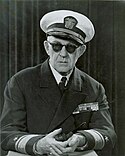John Ford
 | |
| Prawdziwe imię i nazwisko | John Martin Feeney |
|---|---|
| Data i miejsce urodzenia | 1 lutego 1894 |
| Data i miejsce śmierci | 31 sierpnia 1973 |
| Zawód | reżyser, scenarzysta, |
| Lata aktywności | 1917–1971 |
| Odznaczenia | |

John Ford, właśc. John Martin Feeney (ur. 1 lutego 1894 w Cape Elizabeth w stanie Maine, zm. 31 sierpnia 1973 w Palm Desert)[1] – amerykański reżyser twórca westernów takich jak Dyliżans i Poszukiwacze oraz adaptacji amerykańskich powieści – Grona gniewu i Na tytoniowym szlaku. Czterokrotnie nagrodzony nagrodą Akademii Filmowej dla najlepszego reżysera. Zrealizował także dwa oscarowe filmy dokumentalne wyprodukowane przez US Navy, w której służył w latach 1942–1945. Wziął udział w bitwie pod Midway. Służbę w marynarce wojennej zakończył w stopniu komandora porucznika, jako oficer rezerwy został awansowany do rangi kontradmirała.
Filmografia
- Reżyser
- 1919 Rustlers
- Marked Men
- The Big Punch
- Jackie
- The Big Punch
- 1922 Silver Wings
- 1924 Żelazny koń (The Iron Horse)
- 1925 The Fighting Heart
- 1926 Błękitny anioł (The Blue Eagle)
- Trzech złych ludzi (3 Bad Men)
- Hangman’s House
- Four Sons
- Hangman’s House
- 1929 Salute
- The Black Watch
- 1930 W górze rzeki (Up the River)
- Born Reckless
- Flesh
- 1933 Doctor Bull
- Pligrimage
- 1934 The World Moves On
- Patrol na pustyni (The Lost Patrol)
- Sędzia Priest (Judge Priest)
- Patrol na pustyni (The Lost Patrol)
- 1935 Potępieniec (The Informer)
- Steamboat Round the Bend
- Całe miasto o tym mówi (The Whole Town's Talking)
- Steamboat Round the Bend
- 1936 Więzień na wyspie rekinów (The Prisoner of Shark Island)
- Mary Stuart (Mary of Scotland)
- 1937 Strzelec z Bengalu (Wee Willie Winkie)
- Huragan (The Hurricane)
- 1938 Four Men and a Prayer
- The Adventures of Marco Polo
- Submarine Patrol
- The Adventures of Marco Polo
- 1939 Młodość Lincolna (Young Mr. Lincoln)
- Bębny nad Mohawkiem (Drums Along the Mohawk)
- Dyliżans (Stagecoach)
- Bębny nad Mohawkiem (Drums Along the Mohawk)
- 1940 Grona gniewu (The Grapes of Wrath)
- Długa podróż do domu (The Long Voyage Home)
- 1941 Zielona dolina (How Green Was My Valley)
- Na tytoniowym szlaku (Tobacco Road)
- 1942 Bitwa o Midway (The Battle of Midway) – film dokumentalny
- 1943 7 grudnia (December 7th) – film dokumentalny
- 1945 Ci, których przewidziano na straty (They Were Expendable)
- 1946 Miasto bezprawia (My Darling Clementine)
- 1947 Uciekinier (The Fugitive)
- 1948 Trzej ojcowie chrzestni (3 Godfathers)
- 1949 Pinky
- Nosiła żółtą wstążkę (She Wore a Yellow Ribbon)
- 1950 Droga do San Juan (Wagon Master)
- Rio Grande
- When Willie Comes Marching Home
- Rio Grande
- 1952 Spokojny człowiek (The Quiet Man)
- What Price Glory
- 1953 Słońce świeci jasno (The Sun Shines Bright)
- 1955 Rookie of the Year
- 1955–1956 Screen Directors Playhouse
- 1955 Mister Roberts
- The Long Gray Line
- 1956 Poszukiwacze (The Searchers)
- 1957–1965 Wagon Train
- 1957 The Rising of the Moon
- Skrzydła orłów (The Wings of Eagles)
- 1958 Gideon's Day
- The Last Hurrah
- 1959 Konnica (The Horse Soldiers)
- 1960 Sierżant Rutledge (Sergeant Rutledge)
- 1961 Dwaj jeźdźcy (Two Rode Together)
- 1961–1963 Alcoa Premiere
- 1962 Jak zdobywano Dziki Zachód (How the West Was Won)
- Człowiek, który zabił Liberty Valance’a (The Man Who Shot Liberty Valance)
- Scenarzysta
- 1921 The Big Punch
- 1930 W górze rzeki (Up the River)
- 1942 The Battle of Midway
- 1950 Droga do San Juan (Wagon Master)
Nagrody
- Nagroda Akademii Filmowej
- Najlepszy reżyser: 1936 Potępieniec
- 1941 Grona gniewu
- 1942 Zielona dolina
- 1953 Spokojny człowiek
- Najlepszy film dokumentalny: 1943 The Battle of Midway
- 1944 December 7th
- Nagroda na MFF w Wenecji
- Wyróżnienie specjalne: 1934 The World Moves On
- 1936 Mary Stuart
- Nagroda Katolickiego Biura Filmowego: 1952 Spokojny człowiek
- Honorowy Złoty Lew: za całokształt twórczości
- 1971
Przypisy
- ↑ Naval History & Heritage – Rear Admiral John Ford. history.navy.mil. [zarchiwizowane z tego adresu (2006-09-05)]. (ang.) [dostęp 2011-09-29]
Linki zewnętrzne
Bibliografia
- Naval History & Heritage – Rear Admiral John Ford. history.navy.mil. [zarchiwizowane z tego adresu (2006-09-05)].
- ISNI: 0000 0001 2283 5517
- VIAF: 100954749
- ULAN: 500259523
- LCCN: n79064952
- GND: 118534319
- NDL: 00648747
- LIBRIS: dbqsmwnx06nfst5
- BnF: 12444444n
- SUDOC: 033592667
- NLA: 36507899
- NKC: xx0036276
- BNE: XX943480
- NTA: 072144564
- Open Library: OL5111310A
- PLWABN: 9810543914905606
- NUKAT: n2003024445
- J9U: 987007280403405171
- CANTIC: a10086481
- CONOR: 39854691
- KRNLK: KAC201104803
- WorldCat: lccn-n79064952, lccn-nb99150290
Media użyte na tej stronie
Ribbon from the Legion of Merit awarded by the United States Department of Defense.
Baretka amerykańskiego odznaczenia Purple Heart.
Ribbon for the Asiatic-Pacific Campaign Medal awarded by the United States Department of Defense.
Ribbon from the Korean Service Medal awarded by the United States Department of Defense.
Ribbon for the Army of Occupation Medal and Navy Occupation Service Medal awarded by the United States Department of Defense.
Ribbon for the Naval Reserve Medal awarded by the United States Department of the Navy.
Ribbon for the American Defense Service Medal awarded by the United States Department of Defense.
Ribbon from the National Defense Service Medal awarded by the United States Department of Defense.
Director John Ford, who was also a Rear Admiral in the Navy Reserve
Ribbon for the American Campaign Medal awarded by the United States Department of Defense.
Vector illustration based on photo of a Bronze Oak leaf cluster awarded by the United States Department of Defense to be worn as an add-on device on various awards and decorations to denote more than one bestowal of the decoration.
Ribbon for the World War II Victory Medal awarded by the United States Department of Defense.
Autor: SaluteVII, Licencja: CC BY-SA 4.0
Presidential Medal of Freedom (ribbon)



















